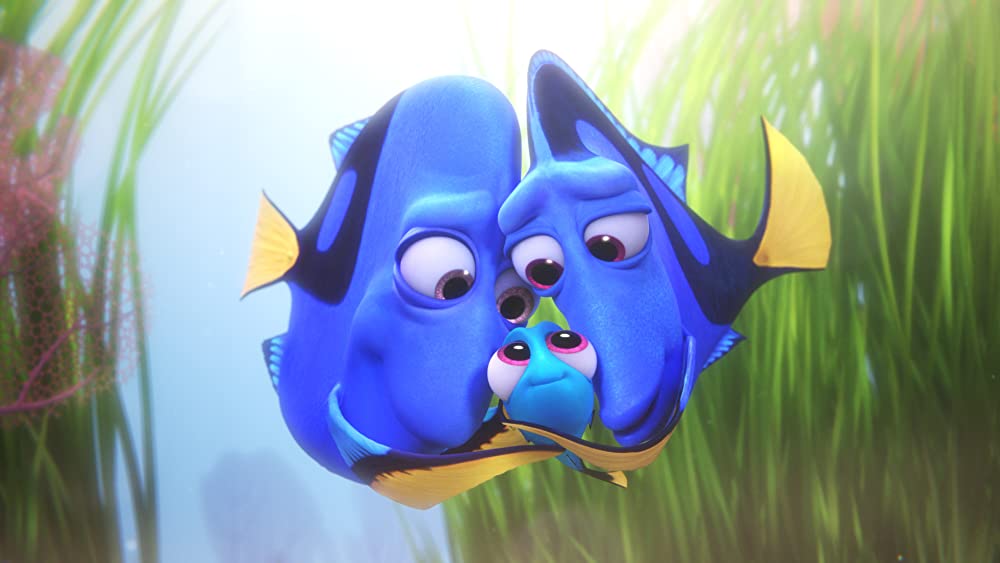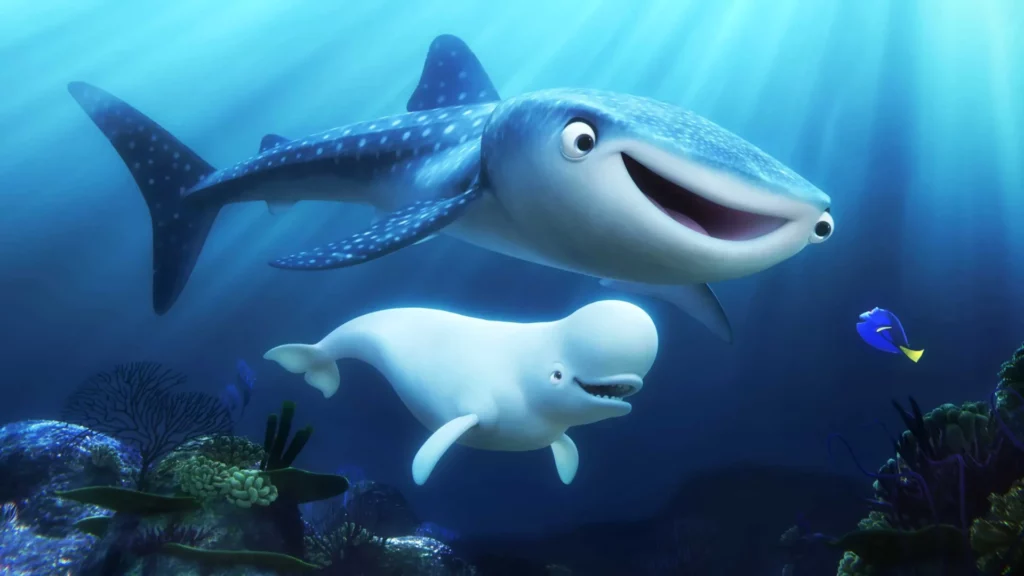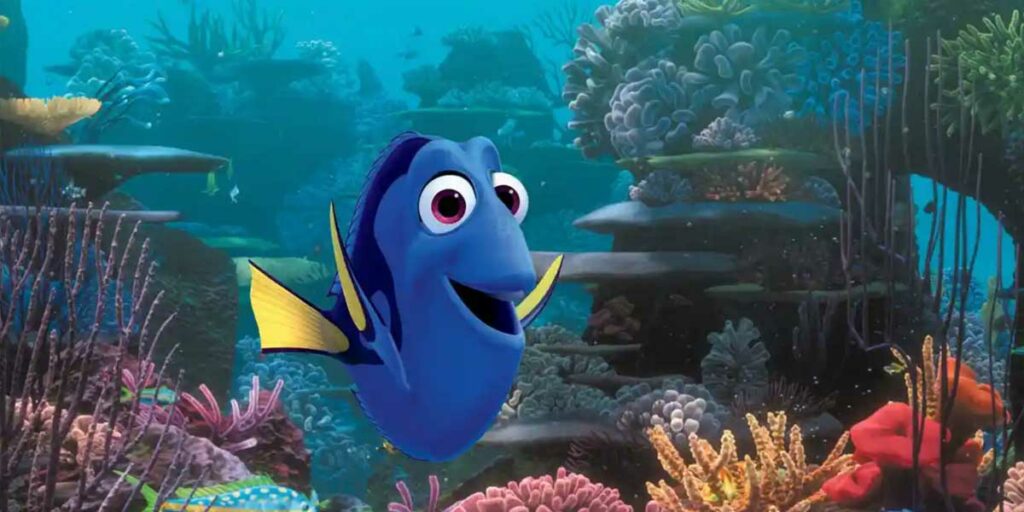Finding Dory ’s heartfelt story about working with disabilities and doubts makes it maybe not one of Pixar’s best films, but one of its most valuable.
Finding Nemo is a treasured childhood film for me, as I’m sure it is for a lot of people around my age. I’d boot it up all the time to the point of memorizing it front to back … although I also did that with Kangaroo Jack, so that’s not the highest praise from me. Still, this one is clearly many notches above most of my other childhood films, and it remains one of my favorite Pixar movies for its heartfelt story, memorable characters, and gorgeous visuals and animation that still hold up today. Which is why I was definitely curious to see how Finding Dory would fare as a sequel from returning director Andrew Stanton over a decade later, starring the comic relief character of the first movie, no less.
Ultimately, Finding Dory seems to be regarded in generally decent light, although I think most people agree it’s not as good as the first movie. While I definitely agree and can’t say it’s an amazing movie, I still feel a deeply personal connection to it for a few very specific reasons, which will require spoilers to discuss fully. The story takes place a year after Finding Nemo and sees Dory (Ellen DeGeneres) suddenly remembering that she has parents she lost as a child, as well as where she’d last seen them. She, along with Marlin (Albert Brooks) and Nemo (Hayden Rolence), travels to California and winds up in a Marine Life Institute facility. With the help of an octopus named Hank (Ed O’Neill), she struggles with navigating the facility and her own short-term memory loss to hopefully find what she’s looking for.
Taking a supporting character from a movie and putting them in the lead role for a sequel, especially one as wacky as Dory, is always a risky move. And it’s not like Pixar’s previous attempt at doing that went over well … like, at all. But Finding Dory did something very smart and shifted how we as the audience view Dory’s short-term memory loss. In Finding Nemo, it’s played mostly for laughs. Here, though it still generates plenty of humor, it’s also a major source of genuine drama for Dory. We see how it’s hindered her and gotten her into trouble, how she feels about it, and even how much anxiety it causes her in particularly tough situations. It’s not just a gimmick; it’s a core part of the film’s heart and the journey she goes through.
Finding Dory has several scenes that surprisingly get my heart racing with the same type of anxiety that Dory’s experiencing. Finding Dory is fast-paced, which sometimes works to its detriment, but in other instances is a huge benefit when so much has to be processed at once. During Dory’s most stressful moments, the imagery becomes blurred, the cutting gets a lot faster, and Ellen DeGeneres excels in what I think is one of the best voice performances I’ve ever heard. I’m not exaggerating. I’m still in awe at every single little inflection she gets, and how she can shift Dory from upbeat and funny to tearful and afraid and everything in between so seamlessly. It’s such a tough balance for a character like this, but she nails it.

I also believe there’s a specific reason Dory finally starts remembering so much about her family: because of the new one she found with Marlin and Nemo. The sensation of feeling loved and like she belongs is something she hadn’t experienced since losing her parents. But a year of being with her new family may have subconsciously triggered memories of those same experiences with her birth family, which can now come to her much more easily … or I’m overanalyzing the talking fish movie, but I stand by this take. It’s so sweet and plays beautifully into the themes of instinct and what people carry with them deep down.
Several reviewers and commentators have made the connection between Dory’s memory loss and other various mental conditions that people have in real life, such as autism, Asperger’s Syndrome, etc. I recognized these parallels right away when watching, because I myself grew up on the autistic spectrum. I’m not no longer officially on that spectrum, but I spent a large bulk of my childhood on it. And when I watch Dory and those around her all react to and try to cope with her condition, it brings back so many memories of my own experiences with autism and how they shaped me into who I am now.
I remember how much help I needed doing what came so easily to other kids, or how stressful seemingly simple tasks could be for me. I remember how useless I would consider myself. I remember feeling like I was making life so much harder on my parents, and I could see them worry about how I would fare when I grew up and whether or not I could ever make it on my own. And I remember trying to be better for them, only to end up making things worse. All of this is explored with Dory, and it strikes a very tender chord with me. She knows what her problems are, she fights to not feel overwhelmed or like she doesn’t deserve what she’s looking for, and she’s surrounded by those who care for her but can also be frustrated by her.
But she also not only overcomes all of that, but sees how her limitation can also serve as a valuable strength. She can look at life in ways not many others do, and she can follow her instincts so much more easily. She develops ways to retain information and learns how to use her habits to her advantage. And she achieves things that no one would have thought she could, earning a loving reunion with her prideful parents who guided her home with what they knew she could do. I related to all of this as well. I am now making it in life, in ways that even ten years ago I thought may be impossible.
I’ve learned how to move through life with my own unique perspectives guiding me. I’ve come to see my autism as its own kind of strength, keeping me away from bad crowds and helping me excel at certain subjects that others struggle with. And my parents always insist how far I’ve come, with me having finally reached a point where I could believe that. I see so much of that life experience reflected in such an uncannily authentic way in Finding Dory. And to top it all off, this is being done with a character that I grew up with. Seeing a childhood memory of mine be transformed into such a reaffirmation of what I’ve been through … that really does get to me, and I find myself choking up every time I watch the entire sequence where Dory, at her lowest, follows the shells laid out by her parents and finally finds them.
This is what makes Finding Dory maybe not one of Pixar’s best movies, but one of their most valuable ones. I’m sure many children who struggle with developmental disabilities like I did have watched the movie and taken so much away from it that will help them through their childhoods. They’ll feel seen and empowered, on top of having an entertaining movie to watch in its own right. This core of the film is really, really powerful … while everything around it is simply good.

I appreciate that Finding Dory manages to make its primary setting way more interesting than I would have expected. A wildlife facility was never going to be as interesting as the vast, open ocean, but the film makes the most of what it’s working with and sets up many creative ways for characters to get around and humorous perils out of what we’d consider trivial. The level of detail in the animation, lighting, and textures is astonishing, but that’s been said so often about Pixar movies that even Dory herself couldn’t ever forget it. Thomas Newman’s score also adds a lot with its impressive range. Any type of scene, whether action-packed, calmly spiritual, or nerve-wracking, has a great piece backing up whatever emotion is needed.
A lot of Finding Dory is filled up by various antics and kooky characters that are done well but don’t really stand out as anything that memorable. The plot always keeps moving, which means the film never gets distracted. But it also means not much really sinks in (get it because stuff sinks in water) outside of Dory’s main problems. There are a few fun enough side characters like Kaitlin Olson’s whale shark Destiny, Ty Burrell’s beluga Bailey, or a loon named Becky. But they’re mostly just kind of … there, serving their purposes and getting just enough chuckles to be likeable. When a joke works, it really works. When it doesn’t, never once does it annoy me, which makes even the weakest bits totally tolerable.
Ironically, the opening stretch of Finding Dory that does take place in the ocean is one of the weaker parts of the movie. It’s mostly just retreading familiar ground from Finding Nemo, though thankfully we enter new territory shortly after. The film also tries to go big with its climax, but that involves a highway chase with an octopus driving a truck and causing all sorts of destruction. It’s fun, but it’s also a little too ridiculous, especially with how it feels somewhat tagged on just to have a climax. (Finding Nemo had a forced climax too, but at least it was quick.)
Still, I’ll take a forced climax over a forced villain. There’s actually no villain at all in Finding Dory, which was pretty rare for an animated family film at the time. I thought maybe it would be Hank – the only new character I found truly memorable – but he comes around to befriending Dory and living a more social life in the ocean. It’s also just nice to see Nemo more directly involved with the main story this time around, letting him have more time with Marlin. The two of them are great as a father-son duo, and you can see how their development from Finding Nemo clearly stuck while still giving them room to grow.
I can very easily see how someone could watch Finding Dory and find it to be just another underwhelming, even forced sequel to a beloved classic. It has a bit of the generic sense of humor and overly-frenetic energy that I feel most Pixar movies of the past decade have had, even the best ones. But it uses those elements well and anchors them around a very thoughtful, heartfelt, and even important story that I still hold a tremendous amount of value in. And that justifies its existence to me and many others.
Finding Dory is now available to watch on Disney Plus.

